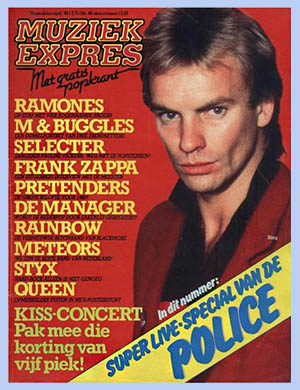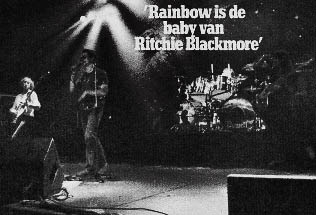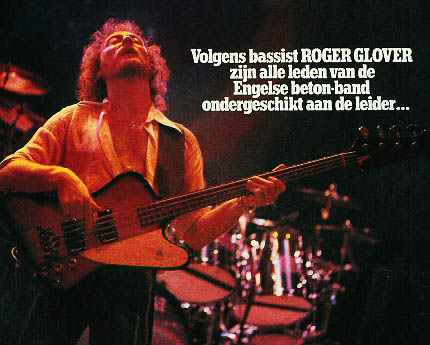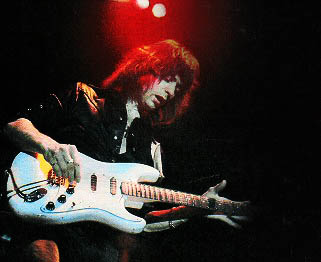|
ROGER GLOVER Rainbow is Ritchie's baby  Ex-Deep Purple guitarist Ritchie Blackmore has ruled Rainbow with an iron hand for years. Every year he invariably throws a number of members of "his" band on the street. However, since the arrival of another ex-Deep Purple member, bassist Roger Glover, the future looks very different.
Ex-Deep Purple guitarist Ritchie Blackmore has ruled Rainbow with an iron hand for years. Every year he invariably throws a number of members of "his" band on the street. However, since the arrival of another ex-Deep Purple member, bassist Roger Glover, the future looks very different.Ritchie Blackmore is known as an executioner. An executioner of a guitarist that is to say and as such crowd puller number one of the English concrete band Rainbow. Blackmore owes this fame mainly to the legendary formation Deep Purple of which he was a part. And actually Ritchie Blackmore more or less continued the Deep Purple sound with his Rainbow project. But somehow Rainbow has never been able to match Deep Purple's success. While the band does have talents in house. Although? Maybe it's just the trick? In that band. After all, how often has Rainbow changed line-ups? Actually Blackmore lasted the longest himself. There is no one left of the first line-up in 1975 with Dio, Gruber, Driscoll and Soule. Blackmore single-handedly kicked his members out of his band. And then did that again a few times. Drummer Cozy Powell who joined the band after the first LP ("Ritchie Blackmore's Rainbow" in 1975) in the most literal sense of the word, smiles a bit at all those group changes: "It's like a football team", says the man who made the sound of Rainbow completely out of concrete again with his drumsticks. Powell also clearly shows that the current Rainbow is determined to stay together a little longer. "We're going like this, so I don't see why the line-up should change." A second LP is on the way  The current Rainbow looks like this: Roger Glover (ex-Deep Purple) on bass, Don Airey on keys, Graham Bonnet (ex-Marbles) vocals, Cozy Powell is the drummer and of course the Maestro himself, also known as a miracle guitarist, Ritchie Blackmore.
The current Rainbow looks like this: Roger Glover (ex-Deep Purple) on bass, Don Airey on keys, Graham Bonnet (ex-Marbles) vocals, Cozy Powell is the drummer and of course the Maestro himself, also known as a miracle guitarist, Ritchie Blackmore.An occupation that seems to be closer than ever before. Also an line-up that will play on more than one album for the first time. "Down To Earth" (1979) was the first in the above line-up and album number two is in the making. Most notable in Rainbow now is the appearance of bassist and producer Roger Glover. Years ago he had been put out of the band by the erratic Blackmore when Deep Purple was on its way out. Roger Glover who then gradually plunged into a solo career that only took shape in the Netherlands with the hit "Love Is All". A single from the project "The Butterfly Ball". Partly thanks to the almost perfect cartoon and no less perfect vocals of Ronnie James Dio, ex-member of Rainbow, "Love Is All" reached number one on our national charts. After some disappointing solo LP results Roger started to focus more and more on producing. That's how it happened that Ritchie Blackmore approached him. Glover about that transaction: "Ritchie and I have the same manager. Rainbow was looking for a producer and through him I was approached. I had no further problems with it. Once Rainbow was ready to go into the studio there was still no bass player. That's why I filled in the basics for the time being. That went well and I was asked to play in Rainbow. After six years of studio work, life 'on the road' attracted me and I took it... You need hits to keep playing Glover and Blackmore teamed up again. And that's pretty special to say the least. Especially when you consider the relationship between those two gentlemen. After the Deep Purple period, it was not exactly a piece of cake. Glover can also have a say in that. "Ritchie and I have a very special relationship. We don't get along at all. When we need something from each other, we write letters. He's very introverted and has strange moods. But Rainbow is not about mutual relationships. The music counts. Rainbow's sound is tight on stage. What's going on out there isn't interesting. At the moment we are all getting along well. That may be different next week. You never know in Rainbow. That tension is an important part of our music. Our music is made by means of a field of tension. But it is also a big risk. For example, the band may fall apart.  In Rainbow you never quite know where you stand. But I like that. Musicians do not look for certainty. "You would take Glover's word. But a little later he actually claims the opposite. Here, he says it himself when he talks about the how and why of his production function.
In Rainbow you never quite know where you stand. But I like that. Musicians do not look for certainty. "You would take Glover's word. But a little later he actually claims the opposite. Here, he says it himself when he talks about the how and why of his production function."As a producer I was caught up to make Rainbow's sound more accessible to the general public. Without losing the aggressive thing that is so recognizable to Rainbow. The single "Since You've Been Gone" is not representative for the band. Look, we really want a hit. Denying that is snobbish. To keep playing you need hits, every band has to be that realistic." Hits or no hits, Rainbow plays well. Not like Deep Purple in the triumph-days, but the successes are not falling out of the air. Especially the Netherlands is very fond of Rainbow, as evidenced by the totally sold out concert in Rotterdam. Seven thousand enthusiastic Rainbow fans showed that well. No, no one has to despair about Rainbow. And Glover? Glover even says he likes Rainbow more than Deep Purple. I am older, I don't expect too much, so everything is fine. Looking back at the Deep Purple period, it was easier compared to later activities..." We now know that Roger Glover started playing bass at Rainbow more or less by accident. He has been doing that for over a year now. But we also know that after about three years of studio work, Roger did not hide the fact that he wanted to go back to the stage. Why did it take so long? Glover says honestly: "I didn't get the chance. Apparently there weren't any groups that wanted me and for which I also had warm feelings. And forming a band was no use. I'm not a leader. Roger Glover's Rainbow, that would be nonsense. It's good to keep making solo LPs next to a band where you put all your abilities in. Just to explore other areas of the music. Cozy made a solo LP and is going to make a second one (with Jeff Beck, ed.). You can also expect a solo LP from me soon. I am more than just a member of the group Rainbow." The boss writes the songs and no one else  An assumption could be that the current Rainbow is doing well because all members outside the band can explore their creative mood. Because they are not allowed to do much more than playing in Rainbow. Ritchie Blackmore's dictatorship is simply too strict for that. Glover is in the fortunate circumstance that he can take care of the lyrics, something Blackmore just isn't very good at.
An assumption could be that the current Rainbow is doing well because all members outside the band can explore their creative mood. Because they are not allowed to do much more than playing in Rainbow. Ritchie Blackmore's dictatorship is simply too strict for that. Glover is in the fortunate circumstance that he can take care of the lyrics, something Blackmore just isn't very good at.Ritchie himself writes all the music. And it doesn't look like anyone else in the band will be composing songs for Rainbow. When asked about it, a painful silence falls and Glover and Powell, who is present at the conversation all the time, exchange a look of understanding. Finally, Glover says, "It's unlikely. Ritchie has always written the songs and he will continue to do so. Rainbow is Ritchie Blackmore's baby, so he will continue to make most of the contributions." When asked if Roger Glover has found his permanent home at Rainbow, the answer is not: "Do you know what you will be doing in two years?" © Muziek Express, Holland, April 1980 |
